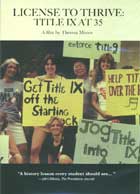
License to Thrive: Title IX at 35 2008
Distributed by Women Make Movies, 462 Broadway, New York, NY 10013; 212-925-0606
Produced by Theresa Moore and Toni Slotkin
Directed by Theresa Moore
DVD, color, 48 min.
Sr. High - Adult
Political Science, Women's Studies, Sports
Date Entered: 10/15/2009
Reviewed by Michael J. Coffta, Business Librarian, Bloomsburg University of PennsylvaniaTitle IX of the Education Amendments of 1972 states that no one participating in a federally funded program may be discriminated against on the basis of sex. This dynamic documentary examines the short term effects, the struggle for equitable implementation of the law, and the legacy of this watershed event in the women’s movement in the US.
Title IX was widely perceived as being associated with sports, but designed to increase opportunities for financial aid, eliminate discrimination on the basis of sex, and increase access to higher education in general. That said, the film offers a good deal of examination of the issue of women in collegiate sports, owed to the fact that Title IX’s earliest and most vociferous opponents clung to this issue. These opponents cited the infeasibility of female football players as their chief barb. Furthermore, the monies devoted to women’s sports would draw funding away from high revenue-generating sports, like football. There is an excellent “point/counterpoint” section with two opponents discussing the dropping of smaller sports (such as men’s wrestling) in favor of “Title IX sports” such as women’s field hockey. Through a good deal of exceptional editing, it feels as though these two are in the same room, answering each other’s criticisms.
Title IX abolished quotas (maximums) for women in educational institutions. It was a catalyst for scholarships, grants, and women-specific programs. The documentary follows those who were early beneficiaries of Title IX. It reinforces the echoing effects on women, going beyond the letter of the law, establishing endowments, creating support networks, and so on. The film makes a conspicuous and enlightened effort to demonstrate how men have promoted Title IX initiatives, both politically and on the family level. The film stresses the need to educate youth of the past. Title IX is not a free ticket, but a source of spirit of equal access to resources to overcome obstacles.
The production quality of this work is positively brilliant. The film is divided into very distinct sections for clear breaks in content and easy navigation. The picture quality and colors are extremely sharp. This superb work is highly recommended to anyone needing a global perspective of Title IX.